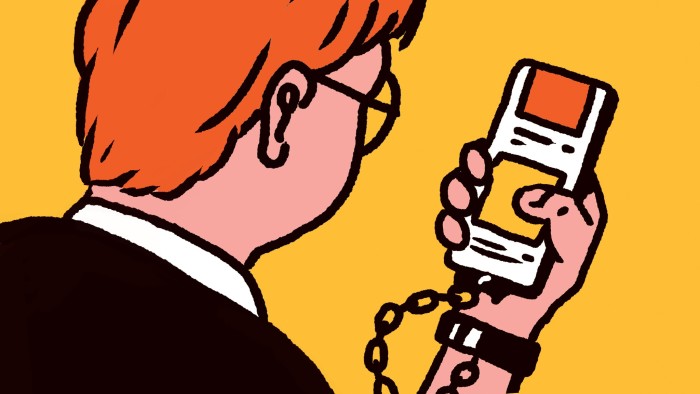Stay informed with free updates
Simply sign up to the Life & Arts myFT Digest — delivered directly to your inbox.
Often, decades pass between a harm appearing and societies fighting it. Scientists knew by the 1950s that smoking killed. The UK finally banned children under 16 from buying cigarettes in 1986. Now an international movement is belatedly forming to stop kids from ingesting another toxin: social media. After Australia’s pioneering ban on its usage by under-16s last year, countries including Indonesia, Switzerland, the Netherlands and France are considering bans for children. The case seems unarguable. Social media have worsened teens’ mental health, empowered criminals and shattered people’s concentration to the point of making the world stupider.
Don’t take it from me. Take it from social media companies, which, like tobacco and oil companies, realised before the public what harm their products do. An internal report by TikTok admits that compulsive usage “correlates with a slew of negative mental effects”. According to one lawsuit against the company, these include “loss of analytical skills, memory formation, contextual thinking, conversational depth, empathy, and increased anxiety”. Oh, and TikTok also damages “sleep, work/school responsibilities, and connecting with loved ones”.
The quotations above and those that follow from TikTok and Snap (owner of Snapchat) were compiled by Jonathan Haidt from legal cases against the companies. Haidt, a social psychologist and author of The Anxious Generation: How the Great Rewiring of Childhood Is Causing an Epidemic of Mental Illness, is campaigning internationally to end the “phone-based childhood”. He says childhood was transformed by a series of innovations starting with the smartphone. High-speed internet got children watching videos. Touchscreens enabled compulsive scrolling. Selfie cameras let girls post images of themselves, then wait terrified for “likes”. Videogaming, porn and gambling gave boys such dopamine hits that anything else they did felt boring.
Social media companies developed an unspoken business model of creating addiction. One-third of Americans aged 13 to 17 are on social media “almost constantly”, found a survey by Pew Research last year.
This is childhood with, in Haidt’s words, “less sleep, shared laughter, sunshine” or free play with friends. It’s a childhood that teaches few skills and unequips kids for learning anything not on a screen. Haidt told me that even at elite New York University, where he teaches, some students lack the concentration to sit through class, read a book or watch a movie.
The few beneficiaries of social media include criminals. Drug dealers “reach teens on Snapchat they would never encounter in real life”, noted one Snap employee. Paedophiles now typically meet children not in parks but on phones. Minors earn money posting sexual videos of themselves. This lays them open to “sextortion”. Snap received 10,000 reports of it a month, according to its internal analysis in 2022. A Snap employee wrote: “10k monthly reports likely represents a small fraction of this abuse, as this is an embarrassing issue . . . not easy to categorize in reporting.”
I know there are always moral panics about new technologies. Older people always think teens have become depraved. However, no other technology swallowed up so much of childhood, almost without regulation. Sure, TikTok, Instagram and Snapchat theoretically bar kids under 13, but there’s very little enforcement. As one Snap executive emailed, “Any child who knows how to type a fake birthday can create an account.” Thirty per cent of British five- to seven-year-olds use TikTok, says the UK’s communications regulator Ofcom.
A large consensus now favours banning children from social media. Three-quarters of French and British people back bans, reports the NGO More in Common. Australia’s ban has bipartisan support. Austria, Brazil and Florida are banning phones from school classrooms.
Haidt says many addicted children would themselves like to quit social media. In a Harris Poll, 47 per cent said they wished TikTok had “never [been] invented”. They’re on it because their peers are. Bans would dispel their fear of missing out.
One political force opposes bans: Silicon Valley’s Washington lobbying firm, the Trump administration. It casts any limits on tech companies as “censorship”. Washington may make a US-UK trade deal conditional partly on Britain scrapping its Online Safety Act. I’m told that US officials said to their German counterparts that if they dared regulate Elon Musk’s site X, that could imperil the American nuclear defence of Germany. The US also hates the EU’s Digital Services Act. Social media could be the next transatlantic battlefield after tariffs and Ukraine. May the good guys win.
Email Simon at [email protected]
Find out about our latest stories first — follow FT Weekend Magazine on X and FT Weekend on Instagram
